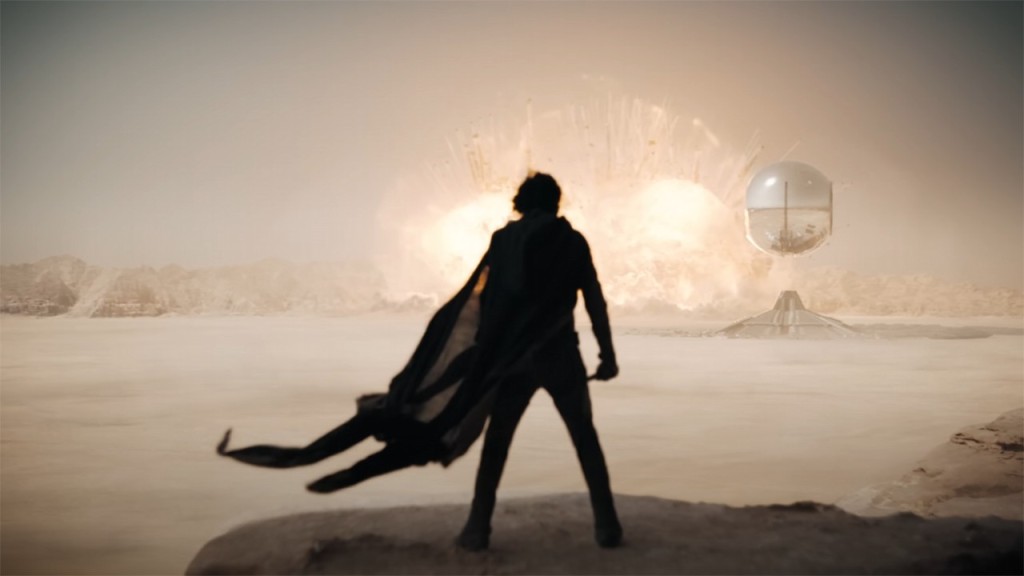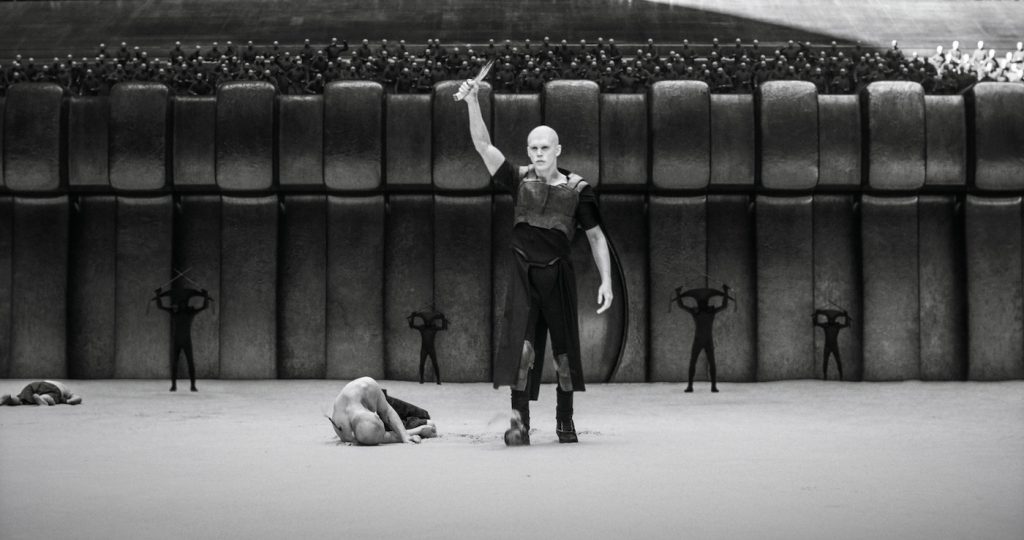Preamble

From the uncertainty of its existence to being delayed due to the Writer’s Strike, Dune: Part Two’s journey to the silver screen has been turbulent, to say the least. But it’s finally here. And it almost goes without saying, I’ve been quite excited about it. But hype levels aside, have you seen Dune: Part Two? And if so, what did you think of it? Let me know in the comments below.
Review

What makes a good adaptation? Is it literal faithfulness to the source material? Capturing the spirit of the original creation? Or is it perhaps making you see the initial work in a completely different way? With this question in mind, Dune: Part Two is many things: Awe-inducing, grand in a truly biblical epic sense and persistently engrossing. But above all, it’s an exceptional adaptation. It honours the themes of Frank Herbert’s novel in such a unique manner that it made me look at the source material in a new light.
Picking up shortly after the events of the first film, Dune: Part Two depicts Paul Atreides (Timothée Chalamet) and Lady Jessica’s (Rebecca Ferguson) attempts to climatize to the desert and Fremen’s ways of living. As the mother-son duo become further entrenched into Fremen life, they have to contend with their place in a prophecy that starts to capture the imagination of certain sects of the tribe. In addition to this, the Harkonnens (now back in control of Arrakis) begin to increase the frequency of their attacks on the Fremen people.
To its credit, Dune: Part Two is an impressive follow-up to the first picture. In fact, it’s quite commendable how both films speak to one another and have a family resemblance in terms of stylistic choices. Both films open with an ominous-sounding alien speaking a line that’s subtitled, and the ending plays like a bookend to the opening scene in the 2021 film. It feels like director/co-writer Denis Villeneuve’s personal signature in terms of highlighting what’s important to his adaptation.
To that end, one of the major themes of Herbert’s novel is the inherent folly that comes from people trusting in charismatic leaders. In Part Two, this theme is filtered through Chani (Zendaya) who gives voice to the view that the prophecy that some of her fellow people believe in is a form of control from the people who created it. Along with the addition of the Southern Fremen (a fundamentalist group of Fremen who believe in the prophecy of the Lisan Al Gaib), this theme is given a lot of room to be explored. It also places a lot of importance on Chani who represents the sceptic and prideful Fremen versus Stilgar (Javier Bardem) who is firm in his belief that Paul is the messiah that’s been spoken of in legend.
At the same time, this theme gives rise to another reading of Paul’s journey, which made me reconsider something about the novel. In a sense, the manufacturing of the prophecy of an outsider coming to liberate the Fremen feels like a metaphor for cultural appropriation. Chani’s view that only a true Fremen should be a messiah along with Paul using the Fremen as an instrument for his vengeance really sold me on this interpretation (in a way that the novel never did). The screenplay is also good at taking lines that existed on the page and placing them in a different context, leading to fascinating reinterpretations. The highlight is Gaius Helen Mohiam (Charlotte Rampling) calling Paul (as opposed to Alia) an abomination, which stings with a sense of tragic irony as she had a hand in creating the prophecy that Paul exploited.
Despite the screenplay being full of these instances, it does fall down in some regards. For one, it indulges in a lot of saying how someone feels as opposed to showing us. The most apparent instance is when Princess Irulan (Florence Pugh) says how her father (The Emperor) took Leto’s death quite badly. Outside of that monologue from the character, I never got anything from Christopher Walken’s performance or the character that he missed Leto. In fact, in a climactic encounter, he speaks matter-of-factly about the fallen leader as opposed to someone who lost someone meaningful. And in an odd change from the first part, the nature of Paul’s visions of his reign seems to change for inexplicable reasons.
Cinematically, Dune: Part Two is a wonder to behold with a broadening of its canvas via elaborate action sequences and large-scale crowd scenes. However, much like the first part, the moments that stood out to me were the smaller ones. An early scene where we see Sietch Tabr for the first time is impressive in creating a level of immersion from handheld camera moves as much as low-angle shots. In the film’s most impressive sequence, the use of long shots combined with fireworks to create a thunder-and-lightning effect results in a haunting noir-esque encounter between Feyd-Rautha (Austin Butler) and Lady Fenring (Léa Seydoux).
Austin Butler steals the movie with a Klaus Kinski-esque intensity. This quality manifests in sharp, caustic line readings and an unpredictable snake-like physicality. Timothée Chalamet’s subtle performance really stood out to me whether it was portraying a sense of sad resignation in the film’s final act or his casual gestures when trying to impress Chani. And Rebecca Ferguson commendably still retains humanity in a role that can seem quite otherworldly and detached.
Hans Zimmer’s score for Dune: Part Two is a beautiful weaving of foreboding ambient music and rich melodic work. In particular, his new love theme for Paul and Chani is excellent in its subtle choral tones and thumping percussive work that makes their bond seem like a strong elemental force.
There’s so much more I could say about Dune: Part Two. Suffice to say, it left me very impressed and grateful. It does not shy away from the concepts and themes that have made the novel an indelible science fiction classic. Instead, it gives life to them and boldly tries to add to them in striking new ways.
